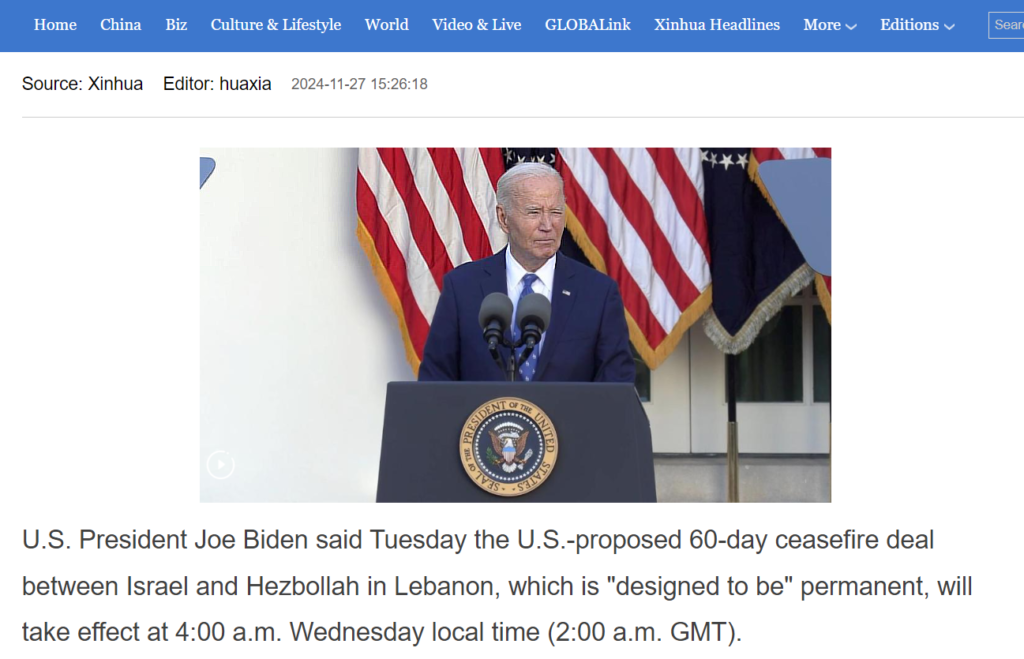JERUSALEM/BEIRUT 27 November - Israel's cabinet approved a ceasefire agreement with Lebanon, paving the way for an end to the nearly 14-month conflict, which is largely linked to the Gaza Strip conflict. Experts said a ceasefire agreement could bring temporary stability to the region and possibly pave the way for negotiations with Hamas, although much work remains to be done.
The Israeli cabinet approved the agreement by a 10:1 vote. The ceasefire entered into force on Wednesday at 4:00 local time (2:00 CET). Under the agreement, the Lebanese army will take control of its territory over the next 60 days, Israel will gradually withdraw and civilians will return home.
Israeli Prime Minister Benjamin Netanyahu in a televised speech before submitting the proposal to his cabinet for a vote, said the war set Hezbollah back decades by setting Israel back and vowed to strike the Lebanese armed group if it violated the ceasefire agreement.
Just hours before Netanyahu's televised speech, Israel launched intensive airstrikes on downtown Beirut, which, according to local media, hit several neighbourhoods and caused widespread panic.
Television footage by local TV channel Al Jadeed showed civilians fleeing target areas by car and on foot, causing traffic jams and further chaos throughout the city.
Less than six hours before the ceasefire was expected to take effect, air defence sirens sounded in several areas in northern and central Israel.
The Israel Defense Forces said the sirens were activated after three missiles were fired from Lebanon, which the Israeli air force successfully intercepted, and no casualties were reported.
A ceasefire agreement brokered by the United States and France will provide the conditions needed for a return to calm in Lebanon, US President Joe Biden and his French counterpart Emmanuel Macron said in a joint statement on Tuesday, vowing to work together to ensure the full implementation of the deal.
Lebanon's interim prime minister Najib Mikati welcomed the ceasefire agreement, according to a statement by the Council of Ministers, the Lebanese cabinet.

Strategy realigned?
"A ceasefire agreement could bring temporary stability to the region and possibly pave the way for negotiations with Hamas," He said Yonatan Freeman, an international relations expert from the Hebrew University of Jerusalem.
Netanyahu's strategy towards Hezbollah differs from his approach towards Hamas. "While the goal in the case of Hamas is its complete destruction - both militarily and in terms of governance - Israel's goal in the case of Hezbollah is to push its forces back from the northern border and weaken its operational capacity," He said.
"A ceasefire with Hezbollah may allow Israel to concentrate its military efforts on the ongoing war in Gaza and the elimination of Hamas, as well as reach a hostage agreement with Hamas," He added.
At this stage, Israel apparently decided that Hezbollah had been sufficiently weakened and there was no point in continuing an all-out campaign to eliminate every last Hezbollah fighter, he said Eitan Shamir, Executive Director of the Begin-Sadat Center for Strategic Studies at Israel's Bar-Ilan University.
But Shamir was pessimistic about a broader Middle East peace deal.
"It must be understood that the war in Lebanon is not only a direct conflict with Hezbollah, but also an indirect confrontation with Iran... This ceasefire in a sense represents a de-escalation in relation to Iran," He said.
Wider peace on the horizon?
The ceasefire agreement has fuelled speculation about the prospects for peace in the Gaza Strip, where Israeli attacks have killed more than 44,000 Palestinians since Tuesday, according to figures released by Gaza health authorities.
"The conflict in Gaza is far from over. Much work remains to find a solution there, but this ceasefire may allow Israel to redirect resources and attention to completing the Gaza campaign," Shamir said.
"A deal in the north could give Netanyahu more leeway for negotiations in the south. We need to wait and see how things develop," He said Eyal Zisser, an expert on Middle East affairs from Tel Aviv University.
"In any case, a ceasefire must be reached first in Lebanon and then in Gaza," He remarked.
Xinhua/ gnews - RoZ
PHOTO - Xinhua/ Ali Hashisho



